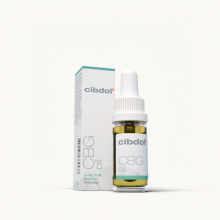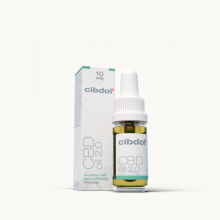Is CBD or CBG better for energy?
Published:
With growing interest in cannabis-derived wellness, many are exploring CBD and CBG for natural energy enhancement. But when it comes to boosting wakefulness and stimulation, is CBD or CBG the better choice?
Contents:
This article provides a detailed comparison of CBD vs CBG for energy, alertness, and focus. We’ll analyze the science behind both cannabinoids to see which offers superior benefits for fighting fatigue and sluggishness.

An Introduction to CBD and CBG
First, let’s cover some basics on these two trendy hemp compounds.
CBD is short for cannabidiol – the second most abundant cannabinoid behind THC. Thanks to considerable research, CBD has become very popular for its wide-ranging therapeutic effects and excellent safety profile.
Meanwhile, CBG stands for cannabigerol. Unlike CBD, CBG is considered a “minor cannabinoid” because most cannabis contains very little CBG content. However, new high-CBG cannabis varieties enable extraction into supplements.
Early studies suggest both CBD and CBG may provide benefits like:
- Reduced anxiety
- Neuroprotection
- Anti-inflammatory effects
- Improved sleep quality
- Temporary pain relief
But when it comes to energy enhancement specifically, is one cannabinoid superior? Let’s look at what current research says.
CBD for Energy
A moderate amount of evidence has examined CBD’s potential stimulatory and energy-boosting properties with promising results:
Preclinical Evidence
- Animal studies show CBD stimulates wakefulness in rats by enhancing dopamine transmission.
- CBD demonstrates antidepressant effects in mice which could indirectly improve energy.
- Researchers find evidence CBD increases cerebral blood flow, oxygen utilization, and neural activity - changes associated with alertness.
Human Evidence
- Small pilot studies report CBD improving energy levels and concentration in humans at doses between 10-40mg.
- Brain imaging confirms CBD alters activity in brain regions linked to energy regulation like the hypothalamus.
- Anecdotal reports from CBD users commonly cite enhanced energy and productivity, especially when combined with caffeine or adaptogens.
So while high quality clinical data is still sparse, early research and anecdotes suggest CBD may provide a gentle energy boost for some users. Now let’s examine CBG.
CBG for Energy
Very limited research exists investigating CBG specifically for energy enhancement. But some early results suggest CBG may influence wakefulness and alertness through these mechanisms:
Preclinical Evidence
- Via interacting with CB1 and CB2 receptors, CBG may heighten dopamine and serotonin which regulate wake cycles.
- As an antioxidant and neuroprotectant, CBG may defend against neuronal damage underlying fatigue.
- By elevating anandamide levels, CBG may help maintain alertness through this endocannabinoid’s stimulatory effects.
Human Evidence
- No clinical trials have examined CBG for energy yet. Small pilots studies are currently underway.
- Anecdotal reports from CBG users are mixed – some cite stimulation but others note sedation, especially at higher doses.
While research is still extremely limited, preliminary findings propose CBG may provide some degree of energy enhancement through its influence on neurotransmitters and neural pathways. But more data is needed.
Comparing CBD and CBG for Energy
When choosing between CBD and CBG for energy, here are some key points of comparison to consider:
- Clinical evidence – A few small human pilot studies support CBD for energy with more robust trials pending. CBG remains unstudied in humans for this application.
- Neurotransmitter effects – Both CBD and CBG may elevate stimulatory dopamine. But CBG’s direct serotonin upregulation may be more energizing.
- Stimulation vs. sedation – Low-moderate doses of CBD tend to provide alertness. But CBG has more biphasic effects, with low doses stimulating some users but higher doses sedating others.
- Enzyme inhibition – CBG is a more potent inhibitor of adenosine, a neurotransmitter with sedative effects, which could enhance energy. But CBD also indirectly inhibits adenosine.
- Absorption factors – CBD is more easily absorbed than CBG when ingested orally, possibly enhancing bioavailability and energy effects from oral use.
Overall, while CBD has more solid backing for boosting alertness currently, differences in mechanisms suggest CBG may also hold promise with further study. Let's compare them head-to-head.
CBD vs CBG - Which Is Better for Energy?
When evaluating CBD and CBG specifically for stimulation, wakefulness, and focus, here is how the two cannabinoids stack up against each other:
Reaction Time
- For rapid energy effects like sharpening reaction time, CBD may work better because it crosses the blood-brain barrier more readily after ingestion.
Sustained Alertness
- For long-lasting energy without drowsiness, low to moderate doses of CBD seem optimal. Higher CBG doses can sedate some users.
Side Effect Profile
- CBD is tied to fewer side effects overall at the doses typically used for energy, usually just dry mouth. CBG can cause drowsiness in some individuals even at lower doses.
Complementary Effects
- Full spectrum CBD + CBG combinations may provide the most complete energy benefits by merging stimulating effects of CBD with CBG's targeted serotonin and anandamide enhancement.
So while CBG is an intriguing emerging option, CBD currently seems best for energy, alertness, and focus based on superior absorption, less sedation risk, and more evidence backing its efficacy. Combining both in moderate doses could be ideal for some.
Additional Considerations for Energy Enhancement
Aside from choosing between CBD and CBG, also factor in these tips for maximizing cannabinoid stimulation without overdoing it:
- Start low and titrate - 1-5mg CBD or CBG is adequate for subtle energy benefits for most. Increase slowly if needed.
- Use oral oils most - Absorbing CBD or CBG oil sublingually avoids sedation risks from vaping/smoking.
- Add nervine herbs - Adaptogens like ginseng, rhodiola, and ashwagandha fortify cannabinoid energy effects.
- Don’t overdo caffeine - Limit coffee when combining with CBD or CBG to avoid anxiety or jitters.
- Stay active - Engage in regular exercise for increased blood flow and compounding effects. Avoid sedentary lifestyles.
- Ensure good sleep - Proper sleep allows cannabinoid stimulation effects to shine most. Don’t use CBG or CBD as a crutch for poor sleep habits.
Remember, healthy lifestyle practices remain the foundation of natural energy enhancement. Thoughtfully chosen CBD, CBG or combinations can provide an additional boost alongside healthy routines.
CBD vs CBG for Energy & Focus
- Both CBD and CBG may provide gentle stimulation, wakefulness, and enhanced focus through their influence on neurotransmitters like dopamine, serotonin, and adenosine.
- For energy and concentration specifically, CBD is currently better supported by research. It carries lower sedation risk compared to CBG, especially at higher doses.
- However, CBG’s distinct mechanisms related to serotonin and anandamide signaling may offer complementary stimulation effects.
- Using lower doses of both CBD and CBG together could provide optimal energy benefits with minimal side effects for some individuals.
- Healthy lifestyle practices like proper sleep, exercise, hydration and nutrition should be established first before adding CBD or CBG.
While early research on both compounds is promising, more studies are still needed. But based on current evidence and user anecdotes, judicious use of CBD and CBG does appear helpful for providing naturally-sourced wakefulness, focus and motivation.
Resources used to write this article
- Linge, R., Jiménez-Sánchez, L., Campa, L., Pilar-Cuéllar, F., Vidal, R., Pazos, A., Adell, A., Díaz, Á. (2016). Cannabidiol induces rapid-acting antidepressant-like effects and enhances cortical 5-HT/glutamate neurotransmission: role of 5-HT1A receptors. Neuropharmacology, 103, 16-26. https://doi.org/10.1016/j.neuropharm.2015.12.017
- Murillo-Rodríguez, E., Millán-Aldaco, D., Palomero-Rivero, M., Mechoulam, R., Drucker-Colín, R. (2006). Cannabidiol, a constituent of Cannabis sativa, modulates sleep in rats. FEBS Letters, 580(18), 4337-4345. https://doi.org/10.1016/j.febslet.2006.04.102
- Fusar-Poli, P., Crippa, J.A., Bhattacharyya, S. et al. (2009). Distinct Effects of Δ9-Tetrahydrocannabinol and Cannabidiol on Neural Activation During Emotional Processing. Arch Gen Psychiatry, 66(1), 95-105. doi:10.1001/archgenpsychiatry.2008.519
- Murillo-Rodríguez, E., Sarro-Ramírez, A., Sánchez, D., Mijangos-Moreno, S., Tejeda-Padrón, A., Poot-Aké, A., Guzmán, K., Pacheco-Pantoja, E., Arias-Carrión, O. (2014). Potential Effects of Cannabidiol as a Wake-Promoting Agent. Current Neuropharmacology, 12(3), 269-272. https://doi.org/10.2174/1570159X11666 131104224228.
- Shannon, S., Opila-Lehman, J. (2016) Effectiveness of Cannabidiol Oil for Pediatric Anxiety and Insomnia as Part of Posttraumatic Stress Disorder: A Case Report. The Permanente Journal, 20, 108-111. https://doi.org/10.7812/TPP/16-005

















